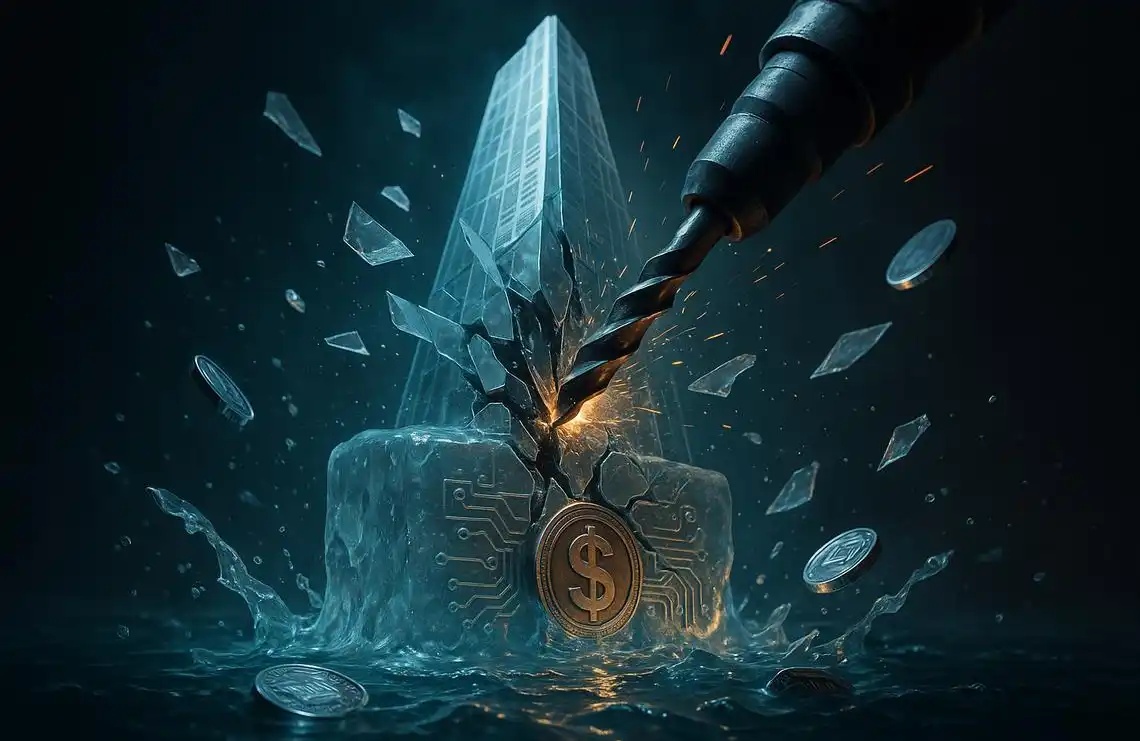BlackRock's asset size breaks the record high of "US$10 trillion". Why can it dominate global finance?
Original title: "BlackRock's asset size breaks the "10 trillion US dollars" new high. How does BlackRock, which is rich enough to rival a country, dominate the global finance?"
Original author: Zhang joy, BlockTempo
Bloomberg ETF senior analyst Eric Balchunas posted on the social platform X yesterday (15th) that the world's largest asset management giant BlackRock's management scale has now reached 10.6 trillion US dollars, setting a new record again:
BlackRock's current asset size has reached 10.6 trillion US dollars, setting a new record again. This year alone, BlackRock's assets have increased by 600 billion US dollars, most of which came from market gains and the other part from capital inflows.
Currently, BlackRock's asset size is more than the sum of Fidelity, CapGroup, Invesco and Franklin.

BlackRock CEO: Bitcoin is digital gold
In addition, Larry Fink, CEO of BlackRock, recently said in an interview with CNBC that his previous view on Bitcoin was actually wrong, but now he has changed his view through learning and believes that Bitcoin is digital gold:
Bitcoin is digital gold, I am a believer in Bitcoin.
In this regard, Eric Balchunas, senior analyst of Bloomberg ETF, also commented that for Larry Fink, who holds $10.6 trillion, it is very reasonable to continue to use Bitcoin as a legitimate investment portfolio through ETFs:
For Larry Fink, who holds $10.6 trillion, it is very reasonable to continue to use Bitcoin as a legitimate investment portfolio through ETFs.
That’s why, in my opinion, anyone who chooses to short the Bitcoin ETF to gain early success is foolish, both now and in the future.

The Legend of BlackRock’s Rise
The story of BlackRock began in 1988, when it was co-founded by Larry Fink and his seven partners.
In its early days, BlackRock focused on providing risk management and fixed-income investment strategies, and gradually accumulated a stable customer base. The company focuses on data-driven investment decisions and has established a strong risk management system, which enabled BlackRock to maintain steady growth during the early market turmoil.
In 1999, BlackRock successfully went public, providing sufficient financial support for the company's future expansion. After the listing, BlackRock continued to strengthen its risk management capabilities and continuously expanded its product lines, covering stocks, bonds, real estate and other fields.
Acquisition and expansion: the realization of economies of scale
BlackRock's rapid rise is inseparable from a series of strategically significant acquisitions. In 2006, BlackRock acquired Merrill Lynch Investment Managers. This acquisition significantly increased BlackRock's asset management scale and further consolidated its position in the global asset management market.
In 2009, BlackRock completed the acquisition of Barclays Global Investors, with total assets under management reaching nearly 3 trillion US dollars. Since then, BlackRock has continued to make multiple acquisitions to continuously expand its market share and product lines.
BlackRock is rich enough to rival a country
At present, for BlackRock, which holds 10.6 trillion in assets, even many sovereign countries may not be able to match it with their national strength. According to PopulationU data, in the 2024 data statistics, the top five global economies in terms of GDP are:
1. The United States: 28 trillion US dollars
2. China: 18.5 trillion US dollars
3. Germany: 4.7 trillion US dollars
4. Japan: 4.3 trillion US dollars
5. India: 4.1 trillion US dollars
It seems that Germany, which ranks third in the world and has a population of more than 80 million, cannot create as much value as BlackRock currently holds after two years of work.
Global Influence: From Investment to Influencing Policy
BlackRock is not just an asset management company, its influence extends across the globe. The company has many important clients around the world, including governments, institutional investors and individual investors. BlackRock actively participates in the formulation of global economic policies and plays a leading role in environmental, social and governance (ESG) investment.
What is the black material about BlackRock?
However, as the world's largest asset management company, BlackRock has also been involved in the following controversies and criticisms.
1. Conflict of Interest
BlackRock has been criticized for having conflicts of interest with the US government and multiple international organizations. In particular, during the financial crisis and the epidemic, BlackRock was hired to manage the government's rescue plan, which raised questions about its objectivity and fairness.
2. Environmental, Social and Governance (ESG) Issues
Although BlackRock has made a lot of efforts to promote ESG investment, there are still critics who believe that its actions are not thorough enough. Some environmental organizations criticized BlackRock for investing in fossil fuels and other highly polluting industries, believing that this is contrary to its claimed sustainable investment philosophy.
3. Market monopoly and excessive influence
Due to the huge scale of assets under management, BlackRock has a very large influence on the financial market. This has raised some concerns about market monopoly and unfair competition. Some people worry that BlackRock's excessive market share may lead to market manipulation and systemic risks.
4. Senior Compensation and Employee Treatment
The compensation of BlackRock's senior management has always been a controversial topic. Critics believe that the compensation of its senior management is too high and the income gap with ordinary employees is too large. In addition, BlackRock has also been accused of having problems with employee treatment, including high work pressure and lack of career development opportunities.
5. Data privacy and security
As a company that relies on data analysis and technology, BlackRock also faces challenges in data privacy and security. Although there have been no major data breaches, some analysts are worried that its huge databases and technical systems may become targets of hacker attacks.
Original link
Welcome to join the official BlockBeats community:
Telegram Subscription Group: https://t.me/theblockbeats
Telegram Discussion Group: https://t.me/BlockBeats_App
Official Twitter Account: https://twitter.com/BlockBeatsAsia


 Forum
Forum Finance
Finance
 Specials
Specials
 On-chain Eco
On-chain Eco
 Entry
Entry
 Podcasts
Podcasts
 Activities
Activities
 OPRR
OPRR








